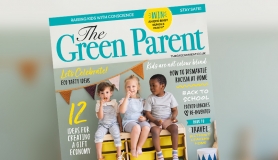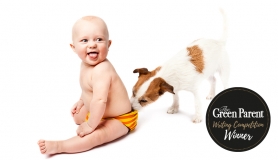The books I have chosen will offer reassurance for parents who feel uncomfortable with strict routines and harsh doctrines about how much physical and emotional contact you should have with your baby. Each title encourages parents to listen to their natural instincts and explains the importance of meeting a child’s early dependency needs.
These books agree that it is not reasonable to expect a baby to be separated from its parents or be left to cry for long periods of time. Compared to other animals, a human baby takes a long time to develop the ability to look after himself, both physically and emotionally, and it is only in meeting these early needs that we can properly foster the sense of security and confidence in our children, that will help them to become a happy, independent child.
The Attachment Parenting Book by William and Martha Sears
William and Martha Sears are two of America’s foremost baby and child care experts, with eight children of their own and over fifty years of professional experience between them. The Attachment Parenting Book is one in a series of books that form the Sears Parenting Library – a collection that covers a host of topics from discipline to family nutrition. The book has a very straightforward approach to attachment parenting and the style of the book makes it very easy to read. Each chapter is kept quite short and is text is often presented in numbered bullet points and broken up with ‘Science Says…’ fact boxes and ‘Attachment tips’.
The Attachment Parenting Book would be a perfect introductory book, offering a very common sense and clearly written approach to the practical application of attachment parenting philosophy.
Attachment Parenting by Katie Allison Granju
This book comes at attachment parenting from a slightly different angle to the Sears’ book. Granju clearly attaches more significance to feeding method, giving over a third of the book to breastfeeding compared to a dozen pages in the Sears book. (Fine by me as a Breastfeeding Counsellor!). Attachment Parenting is obviously extremely well researched. Expert advice from lactation consultants and psychologists is combined with anecdotal evidence from real parents, resulting in a very thorough coverage of the subject. Also included throughout the book are incredibly comprehensive lists of web and print resources as well as detailed references to current relevant research. The information about support groups and organisations may not be as useful as this is an American book but I defy anyone to work through all the references and still not find what they are looking for!
The Continuum Concept by Jean Liedloff
Perhaps attachment parenting in its most extreme form, the Continuum Concept is the result of several years spent by Liedloff living amongst the Yequana Indians of Venezuela. It advocates constant contact between baby and caregiver (usually the mother) at least until the baby is able to move about on their own. This includes bed sharing and breastfeeding on demand. Failure to maintain this, Liedloff believes, can result in mental and social disorders later in life.
The book has attracted very mixed reviews in the past, not least because Jean Liedloff apparently had no children of her own when she wrote it.
Although the underlying principles make sense, the intensity of the 24 hour a day physical contact with your baby that the book suggests would make it an impossible style of parenting for a lot of families. An interesting read from an anthropological point of view but don’t read this expecting a practical parenting manual – you will not be able to help but feel guilty and inadequate!
Read our pick of the best books to support breastfeeding in issue 27 of The Green Parent magazine.







